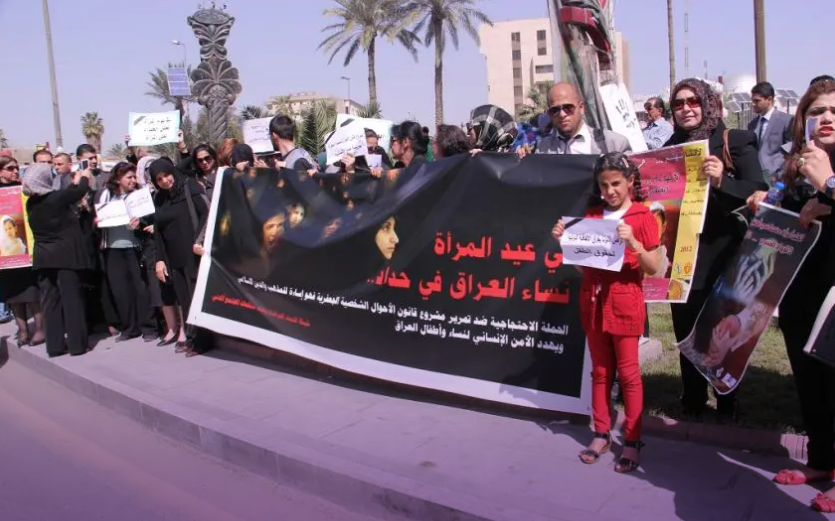On many levels, the Personal Status Laws of Iraq were among the fairest in the region. However, with the Gulf War in 1991, women began to be stripped of their legal rights. It reflected in social practices with the encouragement of the regime, as Saddam Hussein considered that adopting Islamic traditions and some reactionary tribal norms would allow him to establish control during a difficult period. Since then, women in Iraq began a journey of increasing discrimination, systemic violence, and social oppression, in the absence of proper media coverage. Through this text, we will present some of the newly enforced laws and changes that have occurred or have been attempted by the regime to detract from women’s rights in Iraq. And, as a result, we will have a quick overview of the response of the feminist movement to them.
The US occupation and subsequent sectarian wars exacerbated forms of exploitation, violence, and insecurity in Iraq. Such military events led to a deterioration in the situation of women. In 2003, the Human Rights Watch documented a wave of sexual violence and kidnapping in Baghdad. At the time, the report stated that insecurity and the fear of rape and kidnapping kept women in their homes, far from their schools, universities, and work. Although men were also abducted, women who had been through abduction faced social familial stigma due to the concept of honor. Women in southern Iraq were subjected to brutal attacks by militias in Basra, before the Iraqi government took control of the oil-rich region in 2008.
In 2011, in a different report, Human Rights Watch highlighted the plight of young women who are “widowed, trafficked, forced into early marriage, beaten in their homes, and sexually harassed if they leave the house.” The report revealed the involvement of government forces in abuses, including sexual violence against women political activists and women relatives of male dissidents. Until now, perpetrators of violence against women have been protected under Iraqi law, with the Penal Code considering “honor-motivated crimes” as a mitigating factor even in the case of murder, while giving the husband the right to discipline his wife. According to legal expert Ali al-Rabi’i, Article 308, which enforces marriage between a rapist and the rape survivor, constitutes “torpedoing the punishment of rape crimes”, thus decriminalizing it.
Many issues in post-2003 Iraq have raised questions, especially those related to the status of women and what their rights have become, as they are the most targeted during wars and crises. For women and the Iraqi feminist movement, the attempt to abolish the Personal Status Law No.188 of 1959, a law that offers a secular character to marriage and divorce, as well as respect women’s rights in these cases, was the strangest and harshest of all. These attempts were initiated by Paul Bremer, an American civil ruler of the Coalition Provisional Authority – through Resolution 137 of 2003 – in collusion with some religious figures who opposed the 1959 law, based on their patriarchal conception of social relations.
By repealing this law, Bremer tried to make religion and sect the first reference for individuals in their personal legal status. He did this by abolishing the concept of a civil state as much as equality between Iraqi men and women before the law, all the while eliminating all the rights acquired by Iraqi women as set out in the Personal Status Act 188. However, feminist activists reacted to this retrogressive change, pressing for the maintenance of Law 188, and the abolition of Resolution 137 of 2003 (proposed by Bremer) issued by the Governing Council – the first national body to assume power after the occupation authority.
Nonetheless, the battle did not end at this point. The content of the notorious resolution was set as a constitutional article (Article 41) that gives Iraqis the right to refer to their sects in organizing their personal status. Once again, feminist activists called upon the public opinion through advocacy campaigns – which is truly a unique experience in the history of the Iraqi feminist struggle – with the aim of abolishing Article 41. Indeed, this article was frozen, and it is now among the controversial constitutional articles for amendment.
In 2014, the Council of Ministers reviewed the Jaafari Legal Status proposed by the Ministry of Justice, a ministry headed by a representative of an Islamic political party. The aim of this project was to regulate the conditions of those who follow the Shia doctrine, in such a way that they are not bound by state laws, but religious ones. We will not go further into the details of this law, which includes 253 articles, but we will mention some of the articles that show the extent to which this project controls the lives of women in Iraq.
According to researcher Elham Hammadi, article 50, Child Marriage, stipulates that: “The sane Muslim father and grandfather on the paternal side have the exclusive right to forcibly give unto marriage a young boy or girl, or a mentally ill person whose insanity is connected to puberty.”
Article 62, Polygynous Marriage: “The marriage of a fifth woman is not valid as long as the four remain as the man’s wives.” Thus, it is permissible for a man to marry more than one wife, up to four wives, and he may marry another so long as he does not have four wives at the same time.
Article 63, Marriage To Non-Muslim: “The marriage of a Muslim woman to a non-Muslim is absolutely not permitted, as well as the permanent marriage of a Muslim man to a non-Muslim woman who apostates from the Islamic religion.” It is not permissible for a Muslim woman or man to marry someone from the outside of the Islamic religion permanently. However, the law permits a man to marry a non-Muslim woman for a temporary marriage.
Article 101, the husband’s rights over the wife are two: “First – that she enables him of herself whether to approach her, or to have any other enjoyments fixed for him according to the contract, at any time he wishes, and that she does not prevent him except with a legitimate excuse, besides that she must not act in any way to contradict his right to enjoyment. Second – that she does not leave the marital home without his permission.”
Article 108, Disobedient Wife: “If the wife disobeys by denying her husband’s right to enjoy her absolutely, then her right to alimony, to shelter, and to intercourse, shall be forfeited. As for her refusal a few times, as well as leaving her house without the husband’s permission, the alimony is not forfeited.” However, the husband is not considered disobedient – for the same reason – unless he refrained from sexual intercourse with the wife for more than four months (same article).
Article 118, Custody: “If the parents separate and the mother marries another person, her right to custody is forfeited, and it is reserved exclusively for the father, even if she separates from her second husband.”
Article 126, Alimony: “The husband is not obligated to provide for his wife if she is too young for her husband to enjoy her.”
Article 147, Divorce: “Irrevocable divorce, in which the husband does not have the right to return to the divorced woman, whether she had an iddah (a period, prescribed by the Quran, that a woman must observe after the death of her husband or after a divorce) or not, is divided into: A- Divorce of a minor who has not reached (9) nine years of age, even if he consummated the marriage with her intentionally or by suspicion…”
These are some of the provisions dealt with in the new Jaafari law, and are far removed from the content of the Personal Status Law 188, and from human and children rights in particular. Hammadi considers that the worst and most dangerous of these rulings are those related to the marriage of young girls, especially since the legislator did not set a minimum age limit for marriage. This means that her guardian can marry her from the moment she is born. In addition, the aforementioned provisions have made the problem of “the immaturity of the girl’s reproductive system” a “reason for the development of Islamic legislation”. It blames the child for her body’s lack of readiness for the sexual act, and holds her legally and economically responsible.
By enacting the Personal Status Law No. 188, the Iraqi state was moving towards a modernization of its civil legislation through a just approach to women’s rights, but the destruction of these efforts is continuous and sustainable. The draft of the Jaafari Status Law has been frozen, because of pressure campaigns by feminists and the Iraqi civil movement, but the political will behind it is still present and effective. Therefore, we do not know when it will be proposed again and with even more urgency. At the same time, feminists face many challenges, making their work and efforts against this system very hard and almost socially unacceptable. Thus, the presence of women, their political work, and their social or economic activities are marginalized. Their presence in politics as a whole is reduced through dangerous occurrences of violence against women, as well as the domination of a systematic patriarchal thought that belittles their activities and issues, and works to objectify them.
We can see this through the domination of political Islam on the general social and legal perspective of women, which has destructive and oppressive consequences for them. However, all of this did not prevent the growth of an active and strong Iraqi feminist movement, which was manifested through the Iraqi Movement of 2019 (a progressive movement that catalyzed through demonstrations and sit-ins in most Iraqi cities, demanding economic, civil and political rights for all, and the liberation from the control of political Islam, and the rejection of social and political taboos).

Teeba Saad is a member of the World March of Women Iraq and the Iraqi Feminist Uprising Movement.




